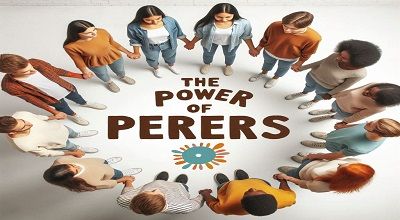Power of Peers
“The Power of Peers” refers to the influence and impact that individuals within a group or community can have on one another. This concept recognizes that people are often shaped and motivated by the actions, opinions, and behaviors of their peers.
The power of peers can manifest in various ways:
- Social Influence: People are influenced by the beliefs, attitudes, and behaviors of those around them. If a peer group values a particular idea or behavior, individuals within that group are more likely to adopt it.
- Peer Pressure: Peer pressure can be both positive and negative. Positive peer pressure encourages individuals to engage in constructive and beneficial activities, while negative peer pressure can lead individuals to make poor choices or engage in risky behaviors.
- Motivation and Support: Being part of a peer group can provide motivation and emotional support. When peers share similar goals and ambitions, they can encourage one another to work towards those goals and provide assistance when needed.
- Social Learning: Peer interactions often involve learning from one another. This can include acquiring new skills, sharing knowledge and information, and learning from each other’s experiences.
- Identity Formation: Peers play a crucial role in the development of a person’s identity. Adolescents, for example, often look to their peer group to understand who they are and where they fit in society.
- Accountability: Peer groups can hold individuals accountable for their actions. Knowing that one’s peers are watching or expecting certain behavior can lead to responsible actions.
- Collective Action: When like-minded individuals come together, they can collectively work towards common goals or address issues they care about. The power of peers can be harnessed to bring about social change or advance shared interests.
- Mentorship: Peers can serve as mentors, providing guidance and support to one another. Mentorship within peer groups can be a valuable source of learning and personal development.
Summary
Understanding the power of peers is important in various contexts, such as education, workplace dynamics, and community development. It highlights the significance of the social environment and the role that interpersonal relationships play in shaping individual choices and behaviors. The influence of peers can be both positive and negative, making it important to foster healthy, supportive peer relationships and promote responsible decision-making within groups.
